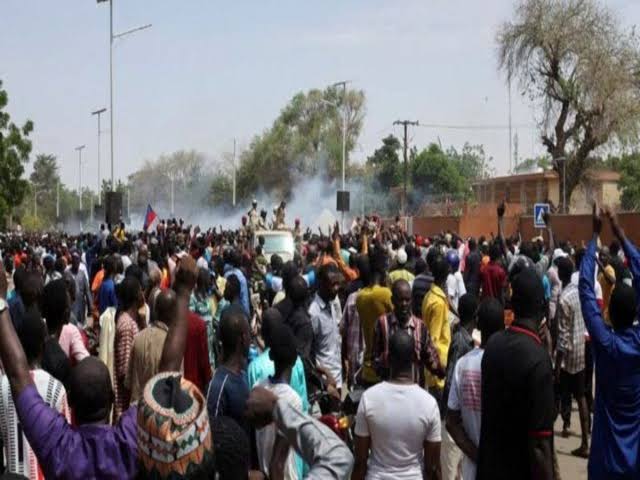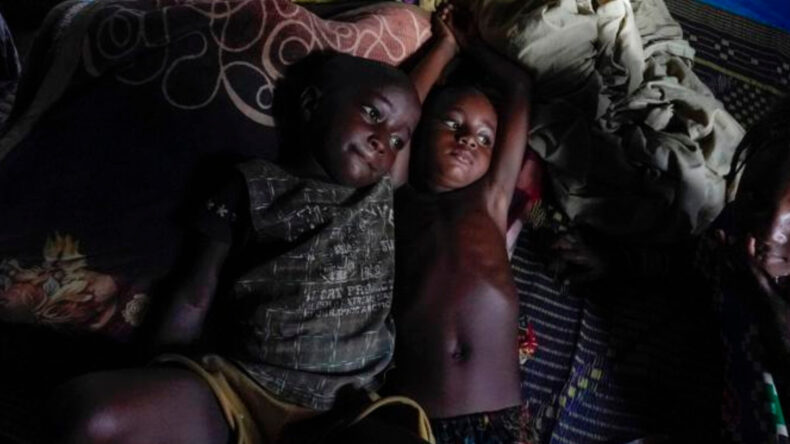
The ongoing crisis in Niger has taken a dangerous turn as European nations rush to evacuate their citizens amidst escalating tensions caused by the recent military coup. The coup, which toppled the country’s democratically elected president, has drawn support from other military juntas in the region, raising concerns about the potential for further instability.
European countries, including France, Italy, and Spain, have taken swift action to ensure the safety of their nationals in Niger. A French military transport plane carrying Europeans arrived in Paris, marking the first evacuation flight since the mutinous soldiers overthrew President Mohamed Bazoum nearly a week ago. Officials report that around 600 French nationals and approximately 400 individuals of other nationalities, from Belgians to Danes, are seeking to leave the country. The evacuation process is expected to be completed by Wednesday.
Despite the closure of Niger’s airspace, France has coordinated with the new junta to conduct the evacuations. Diplomatic officials clarify that this move does not imply a withdrawal of support for President Bazoum, who was democratically elected. The decision to evacuate was partly influenced by recent violence directed at the French Embassy in Niamey, the capital city. In solidarity, Spain’s Defense Ministry also prepared to evacuate over 70 of its citizens, while Italy made arrangements for a similar flight.
The crisis in Niger has been further exacerbated by the coup, creating a setback for Western nations that were previously collaborating with the country to combat West African extremists. The situation has prompted concerns about the safety and security of civilians, including foreign nationals residing in the country. At Niamey hotels and the airport, scenes of apprehension and urgency were observed as Europeans and other nationalities, including some Americans, packed their bags and lined up for evacuation flights.
Meanwhile, neighbouring countries, Mali and Burkina Faso issued a joint statement, warning that any military intervention against Niger would be considered a declaration of war against them. The two nations also denounced the economic sanctions imposed on Niger by the Economic Community of West African States (ECOWAS) as “illegal, illegitimate, and inhumane,” refusing to abide by them. ECOWAS had suspended all commercial and financial transactions between its member states and Niger, leading to potential adverse effects on the country’s already vulnerable economy, which heavily relies on foreign aid.
Mali and Burkina Faso have both experienced military coups in recent years, with soldiers overthrowing governments in an effort to combat increasing jihadi violence linked to groups like al-Qaida and the Islamic State. While ECOWAS suspended both countries from its bloc, they have not faced the threat of military intervention.
Adding to the complexity of the situation, Guinea, which has been under military rule since 2021, also voiced support for Niger’s junta and called on ECOWAS to reconsider its stance on the crisis.
The violence that targeted the French Embassy in Niamey led to clashes between protesters and the Nigerian army. Thousands of pro-junta supporters flooded the streets, displaying signs with messages like “Down with France,” alongside Russian flags and expressions of support for Russian President Vladimir Putin. The significance of the references to Russia remains unclear, but some analysts speculate that they may reflect anti-Western sentiments or admiration for the Russian private military group Wagner’s reputation for suppressing militants.
Concerns have also emerged that the coup in Niger could embolden jihadi violence in the region. Boubacar Moussa, a former member of an al-Qaida-linked group known as JNIM, asserts that the coup plays into the hands of jihadists, as it can distract and weaken the army, allowing the extremist groups to gain strength. Niger’s crisis, if not resolved peacefully, may escalate into further violence, pitting civilians supporting the coup against those opposing it.
In response to the crisis, Niger’s Prime Minister Ouhoumoudou Mahamadou, appointed by President Bazoum, called on the international community to intervene and support democracy in West Africa. Niger plays a crucial role in regional and global security, and the outcome of the crisis is of utmost importance to the stability of the continent and beyond.
As the situation continues to evolve, the international community closely monitors developments in Niger. Both the United States and France have been significant contributors of military and humanitarian aid to the country, with their assistance dependent on continued democratic governance. However, the crisis poses serious challenges to the stability of the nation and the region, calling for diplomatic efforts and cooperation to find a peaceful resolution.













